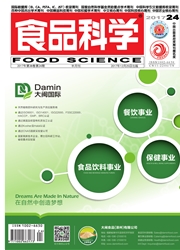

 中文摘要:
中文摘要:
以‘巨峰’葡萄果实(VitisviniferaL.×V,labruscaL.CV.‘Kyoho’)为试材,研究了10μmol/L茉莉酸甲酯(methvljasmonate,MeJA)熏蒸处理对采后葡萄果实在1℃贮藏期间酚酸含量和抗氧化活性的影响,并从苯丙烷类代谢角度分析了相关机理。结果显示:10μmol/LMeJA处理可显著抑制葡萄果实贮藏期间腐烂率和落粒率的上升,诱导苯丙烷类代谢关键酶苯丙氨酸解氨酶(PAL)、肉桂酸羟化酶(C4H)和查耳酮合成酶(CHS)活性的上升并延缓对香豆酰-CoA连接酶(4-CL)活性的下降,同时显著提高果实主要酚酸(没食子酸、咖啡酸、原儿茶酸、丁香酸和p-香豆酸)和总酚含量并维持了DPPH自由基清除率和总还原力。结果表明:MeJA可通过调控葡萄果实苯丙烷类代谢相关酶系的活性,从而有效诱导果实中酚酸的合成并维持果实贮藏期间抗氧化活性,最终提高了果实采后食用和营养品质。
 英文摘要:
英文摘要:
In the present study, the effect of 10 μmol/L MeJA (methyl jasmonate) treatment on the synthesis and antioxidant activity of phenolic acids in grape berries (Vitis vinifera L. X V. labrusca L. cv. 'Kyoho') during storage at 1 ℃ was investigated and the corresponding mechanisms were also explored based on phenylpropnaoid metabolism. The results showed that MeJA treatment could significantly inhibit the decay rate and abscission rate of grape berries, induce the increase in activities of key enzymes involved in phenylpropnaoid metabolism including phenylalanine ammonia-lyase (PAL), cinnamate 4-hydroxylase (C4H) and chalcone synthase (CHS) and delay the decrease in 4-CL activity. Meanwhile, a remarkable enhancement of phenolic acids (gallic acid, caffeic acid, protocatechuic acid, syringic acid, p-coumaric acid) and total phenolics was observed, and 1,1-diphenyl-2-picrylhydrazyl (DPPH) radical scavenging capacity and reducing power of grape berries during storage was maintained. These results implied that MeJA treatment markedly promoted the synthesis of phenolic acids and maintained antioxidant activity through the regulation of phenylpropanoid-related enzymes, thus finally improving the edible and nutritional quality of postharvest grape berries.
 同期刊论文项目
同期刊论文项目
 同项目期刊论文
同项目期刊论文
 Response of direct or priming defense against Botrytis cinerea to methyl jasmonate treatment at diff
Response of direct or priming defense against Botrytis cinerea to methyl jasmonate treatment at diff Effect of ethanol treatment on disease resistance against anthracnose rot in postharvest loquat frui
Effect of ethanol treatment on disease resistance against anthracnose rot in postharvest loquat frui 期刊信息
期刊信息
